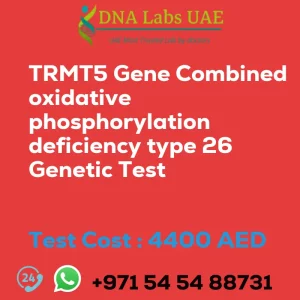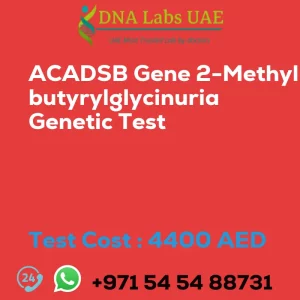SLC25A1 Gene Combined D-2- and L-2-hydroxyglutaric aciduria Genetic Test
At DNA Labs UAE, we offer the SLC25A1 Gene Combined D-2- and L-2-hydroxyglutaric aciduria Genetic Test for individuals who suspect they may have this rare genetic disorder. This test can provide valuable information for healthcare professionals in terms of confirming a diagnosis, understanding the genetic basis of the disorder, and potentially guiding treatment options.
Test Components
- Price: 3200.0 AED
- Sample Condition: Blood or Extracted DNA or One drop Blood on FTA Card
- Report Delivery: 3 to 4 Weeks
- Method: NGS Technology
- Test type: Metabolic Disorders
Doctor and Test Department
This test can be ordered by a General Physician and is conducted in our Genetics Test Department.
Pre Test Information
Before undergoing the SLC25A1 Gene Combined D-2- and L-2-hydroxyglutaric aciduria Genetic Test, it is recommended to provide the clinical history of the patient. Additionally, a Genetic Counselling session may be conducted to draw a pedigree chart of family members affected with Combined D-2- and L-2-hydroxyglutaric aciduria.
About the SLC25A1 Gene and Combined D-2- and L-2-hydroxyglutaric aciduria
The SLC25A1 gene is responsible for encoding a protein called the mitochondrial citrate transporter. Mutations in this gene have been associated with a rare genetic disorder called combined D-2- and L-2-hydroxyglutaric aciduria. This disorder is characterized by the accumulation of D-2-hydroxyglutaric acid (D-2-HGA) and L-2-hydroxyglutaric acid (L-2-HGA) in the body.
In individuals without this disorder, these acids are normally produced during various metabolic processes but are usually broken down and eliminated. However, individuals with combined D-2- and L-2-hydroxyglutaric aciduria have a deficiency in the mitochondrial citrate transporter, leading to the buildup of D-2-HGA and L-2-HGA.
NGS Genetic Testing for Combined D-2- and L-2-hydroxyglutaric aciduria
Next-Generation Sequencing (NGS) genetic testing is a technique used to analyze multiple genes simultaneously and identify genetic mutations or variations associated with certain disorders. In the case of combined D-2- and L-2-hydroxyglutaric aciduria, NGS genetic testing can be used to detect mutations in the SLC25A1 gene, which can help confirm a diagnosis of the disorder.
This type of genetic testing involves sequencing the DNA of an individual to identify specific changes or mutations in the SLC25A1 gene. The results of the test can provide valuable information for healthcare professionals in terms of confirming a diagnosis, understanding the genetic basis of the disorder, and potentially guiding treatment options.
If you suspect you may have combined D-2- and L-2-hydroxyglutaric aciduria or have a family history of the disorder, we recommend considering the SLC25A1 Gene Combined D-2- and L-2-hydroxyglutaric aciduria Genetic Test. Contact DNA Labs UAE today to schedule an appointment or for more information.
| Test Name | SLC25A1 Gene Combined D-2- and L-2-hydroxyglutaric aciduria Genetic Test |
|---|---|
| Components | |
| Price | 3200.0 AED |
| Sample Condition | Blood or Extracted DNA or One drop Blood on FTA Card |
| Report Delivery | 3 to 4 Weeks |
| Method | NGS Technology |
| Test type | Metabolic Disorders |
| Doctor | General Physician |
| Test Department: | Genetics |
| Pre Test Information | Clinical History of Patient who is going for SLC25A1 Gene Combined D-2- and L-2-hydroxyglutaric aciduria NGS Genetic DNA Test A Genetic Counselling session to draw a pedigree chart of family members affected with Combined D-2- and L-2-hydroxyglutaric aciduria |
| Test Details | The SLC25A1 gene is responsible for encoding a protein called the mitochondrial citrate transporter. Mutations in this gene have been associated with a rare genetic disorder called combined D-2- and L-2-hydroxyglutaric aciduria. Combined D-2- and L-2-hydroxyglutaric aciduria is a metabolic disorder characterized by the accumulation of D-2-hydroxyglutaric acid (D-2-HGA) and L-2-hydroxyglutaric acid (L-2-HGA) in the body. These acids are normally produced during various metabolic processes but are usually broken down and eliminated. However, individuals with this disorder have a deficiency in the mitochondrial citrate transporter, leading to the buildup of D-2-HGA and L-2-HGA. NGS (Next-Generation Sequencing) genetic testing is a technique used to analyze multiple genes simultaneously and identify genetic mutations or variations associated with certain disorders. In the case of combined D-2- and L-2-hydroxyglutaric aciduria, NGS genetic testing can be used to detect mutations in the SLC25A1 gene, which can help confirm a diagnosis of the disorder. This type of genetic testing involves sequencing the DNA of an individual to identify specific changes or mutations in the SLC25A1 gene. The results of the test can provide valuable information for healthcare professionals in terms of confirming a diagnosis, understanding the genetic basis of the disorder, and potentially guiding treatment options. |







